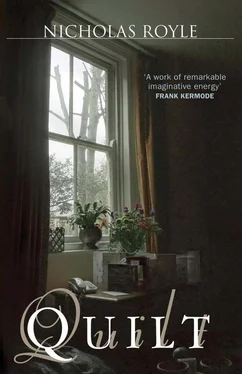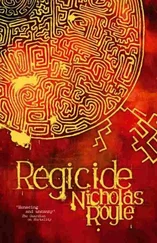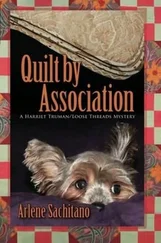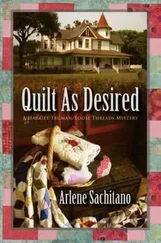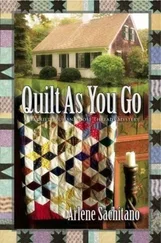Nicholas Royle - Quilt
Здесь есть возможность читать онлайн «Nicholas Royle - Quilt» весь текст электронной книги совершенно бесплатно (целиком полную версию без сокращений). В некоторых случаях можно слушать аудио, скачать через торрент в формате fb2 и присутствует краткое содержание. Год выпуска: 2011, Издательство: Myriad Editions, Жанр: Современная проза, на английском языке. Описание произведения, (предисловие) а так же отзывы посетителей доступны на портале библиотеки ЛибКат.
- Название:Quilt
- Автор:
- Издательство:Myriad Editions
- Жанр:
- Год:2011
- ISBN:нет данных
- Рейтинг книги:4 / 5. Голосов: 1
-
Избранное:Добавить в избранное
- Отзывы:
-
Ваша оценка:
- 80
- 1
- 2
- 3
- 4
- 5
Quilt: краткое содержание, описание и аннотация
Предлагаем к чтению аннотацию, описание, краткое содержание или предисловие (зависит от того, что написал сам автор книги «Quilt»). Если вы не нашли необходимую информацию о книге — напишите в комментариях, мы постараемся отыскать её.
Quilt — читать онлайн бесплатно полную книгу (весь текст) целиком
Ниже представлен текст книги, разбитый по страницам. Система сохранения места последней прочитанной страницы, позволяет с удобством читать онлайн бесплатно книгу «Quilt», без необходимости каждый раз заново искать на чём Вы остановились. Поставьте закладку, и сможете в любой момент перейти на страницу, на которой закончили чтение.
Интервал:
Закладка:
Lorraine
Hardy
Cary
Marty
Barry
Bryan
Ryan
Raymond (N.B. not to be abbreviated)
I was leaning backwards on the couch and losing all sense of my elements, staring round me into the great glass space. I counted all twelve, bleached-bone-white, with their pug-nosed, almost sharky heads, long thin dark spines like antennae, and stretched-out disc fins closely resembling wings. Underwater birds in a phantom aviary. The huge tank was incessantly shifting, a world of braking and accelerating, altering shapes and directions, a busy submarine airport, uncontrollable traffic of miniature chubby Concordes. At one moment they looked like water-filled white paper bags, the next they were dreaming and slow-winged as flamingos, flapping up into the ether. Then each seemed a cloud-white cruise missile, a disembodied flamboyant cuff brandishing a rapier, an upside-down technician with an antenna that turns its body into a walkie-talkie, a trapeze artist gathered at the end of its own tightrope. They appeared to me then more spectral than the motoros , or anything I had ever seen. My eyes were filming over.
Everyone knows. This is no whodunit.
My love was written in the starry sky above our heads.
As intrepid as a somnambulist I made my way to the stairs and mounted them as if for the first time, holding onto the handrail fashioned from the trunk of a young pine. It was dark, for all the doors were shut. I looked into his father’s study and hardly recognised it: glowing polished wooden floorboards, a new sofa and armchair, family paintings on the walls, and a filing cabinet. By the window, looking out, I realised also how much had been done to the garden. At the other end of the corridor I pushed on the door: his own bedroom was vacant, not even the bed remained. Once more I called out his name, and heard nothing but the absurdity of my own voice.
As I walked back along the midday twilight of the corridor, I felt, tingling in my eyes, virtually breaking me down at every step, exactly what lay beyond. As I opened the door of his parents’ room the light seemed at once to stream in and hold. Tears were running down my face. It was a translucent cave. It was crazier than anything downstairs, perhaps in part because of its elevated location. It is part of the law of probability, Aristotle said, that many improbable things happen. What used to be the en-suite bathroom was now incorporated with the bedroom into a remarkable belvedere. The floor must have been reinforced, I told myself. And as I did so, I felt again an estranging taciturnity in the sound of my voice, even within the space of my own head. I gazed up into the depths. The sky had disappeared. It was a manta, the biggest ray, the strangest thing I had ever seen in a house. It seemed, indeed, bigger than the house, arching like a rainbow, majestically large, its great wings black and thin, conforming exactly with that cloak concealing nothing that its name implies. It was hanging, yes, in the watery light, but not motionless. The great pectorals like a double parabola, undulating, arching, in curvy pulsions, the sweeping down of a horseless highwayman, black as night, white as forest snow, it moved at once too easily, slowly and quickly to take in. It was in motion, but it barely moved. Hypnotic: yes, suspended. From the eversion of its underside it seemed to gambol like a lamb. And then it was a bizarre lover fetching invisible pastry straight from the bakery, wearing floppy black oven-gloves. Interminably in need, wherever was I to source the plankton and the nanoplankton? As if dissolving once again, gently shrugging off into a new form, chalk verticality, raft into the shadows of the underworld, veracity in black and white, it seemed momentarily to swing towards me with inhuman inquisitiveness, nudging against my vision, proffering its paddle-like cephalic lobes, head-wide mouth and staggering great white belly with five long slashes of gills. I looked around for some kind of note, a letter, the briefest message, but there was no sign of anything anywhere.
AFTERWORD: Reality Literature
THERE is something at once comforting and strange about the idea of an afterword to a novel. This would be the place where, like dust settling after the massacre, the author considers what happened. Holding out the promise of some illuminating information or ideas about the foregoing pages, the afterword is also, by convention, happily brief: it is a ‘word’, after all, not ‘words’. In these respects the afterword, the very appearance of the word ‘Afterword’ on a new page near the end of the book, is a reassuring sign: relax, everyone, the novel is over, and what follows is just an add-on. You can take it or leave it. This last bit, if you like that sort of thing, offers an easy-going transition or exit out of the book.
A number of questions nonetheless linger and complicate this enterprise. Does the afterword truly come after the novel or before, especially given its apparent concern with why or how the work came to be written? Is the author of the afterword simply the same as the author of the novel? What happens if he begins by solemnly declaring that he is not ? (I hereby promise: I am not.) What happens if he starts talking or writing like one of the characters or narrators in the book and gradually convinces us that this is in fact who he is? Or if he steadily persuades us that he (or she) is a quite new and different being, but no more or less real than anyone we encountered in the preceding pages? Are we so sure, after all, that what we were reading was a novel? And is it so certain that the afterword is not a peculiar continuation of it?
The novel is a space of play. In the past, questions of this sort have generally been part of the entertainment. Writing in the eighteenth century, Richardson, Smollett and Defoe (or their narrators) provoke questions about the novel’s truth, identity and seriousness from the start. In those days it was the preface (or some prefatorial equivalent), rather than an afterword, that raised such issues. We tend to take the playfulness of such prefaces for granted today, and conversely look to an afterword in expectation of a certain earnestness and authenticity. In recent decades we had the ‘death of the author’ to contend with, but we recovered from this or, at least, we like to suppose the author recovered. False alarm, folks — and, if you want evidence of the author’s vitality and genuineness, one of the first places to look is the afterword to a novel! The fact that there is today an apparent preference for the afterword might suggest a curious conservatism in reading, or a firmer policing of the way in which novels are organised and their inherent delinquency controlled. The potential of a preface to mislead the reader is dispatched; the afterword seems a more restrained, less worrying genre.
But perhaps we have not yet really begun to think about the strangeness of the afterword as a genre — about its ability, for example, to unsettle the reader’s sense of time and causality, to alter the conception of the author, and to threaten or put further into disarray distinctions between fiction and nonfiction. The afterword might thus begin by pointing out that it is the preface that is really the backward genre, since it is invariably written after the work to which it refers: the preface is conventionally just an afterword in disguise. Whereas an afterword (this one I am beginning to imagine here) is a quite crazy thing in which anything could happen. It might go anywhere . It might easily turn out to be longer than the work preceding it . It might even seek to inaugurate a new kind of writing and give it a name: reality literature .
A novel has to do what it has always done: tell a story, give pleasure, compel and surprise us. But the situation of ‘the novel today’ is singular and unprecedented. It faces challenges and pressures unimaginable in earlier times. It is difficult not to think of writing a novel as an offensive, at best risible instance of ‘fiddling while Rome burns’ — in other words, while a world war rages all around, with the control and ownership of Jerusalem at its heart, more of the world’s population than ever before live in poverty and hunger, women more or less everywhere continue to be positioned as inferior members of the human race, the environment of the planet is being systematically and rapidly destroyed, and non-human animal species are being wiped out daily. How is the novel to respond to this, while trying to do what it has always done? What are a novelist’s responsibilities in this context?
Читать дальшеИнтервал:
Закладка:
Похожие книги на «Quilt»
Представляем Вашему вниманию похожие книги на «Quilt» списком для выбора. Мы отобрали схожую по названию и смыслу литературу в надежде предоставить читателям больше вариантов отыскать новые, интересные, ещё непрочитанные произведения.
Обсуждение, отзывы о книге «Quilt» и просто собственные мнения читателей. Оставьте ваши комментарии, напишите, что Вы думаете о произведении, его смысле или главных героях. Укажите что конкретно понравилось, а что нет, и почему Вы так считаете.
